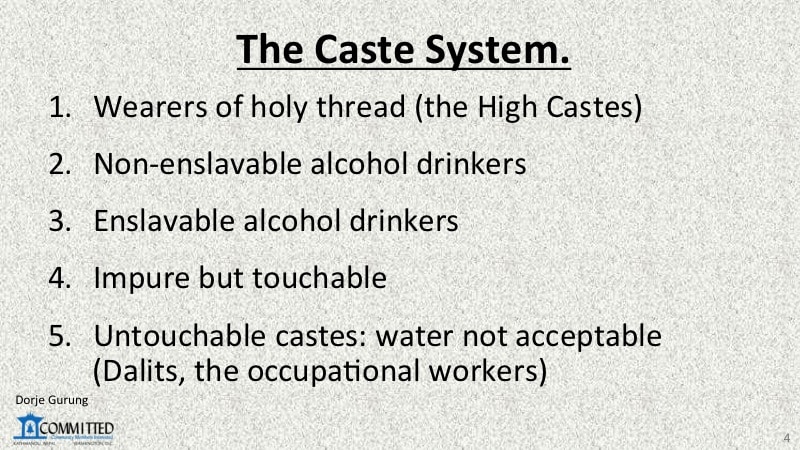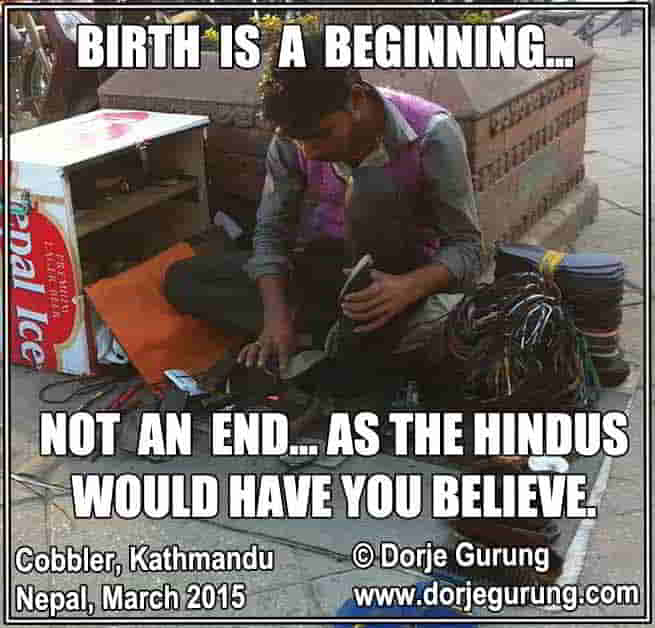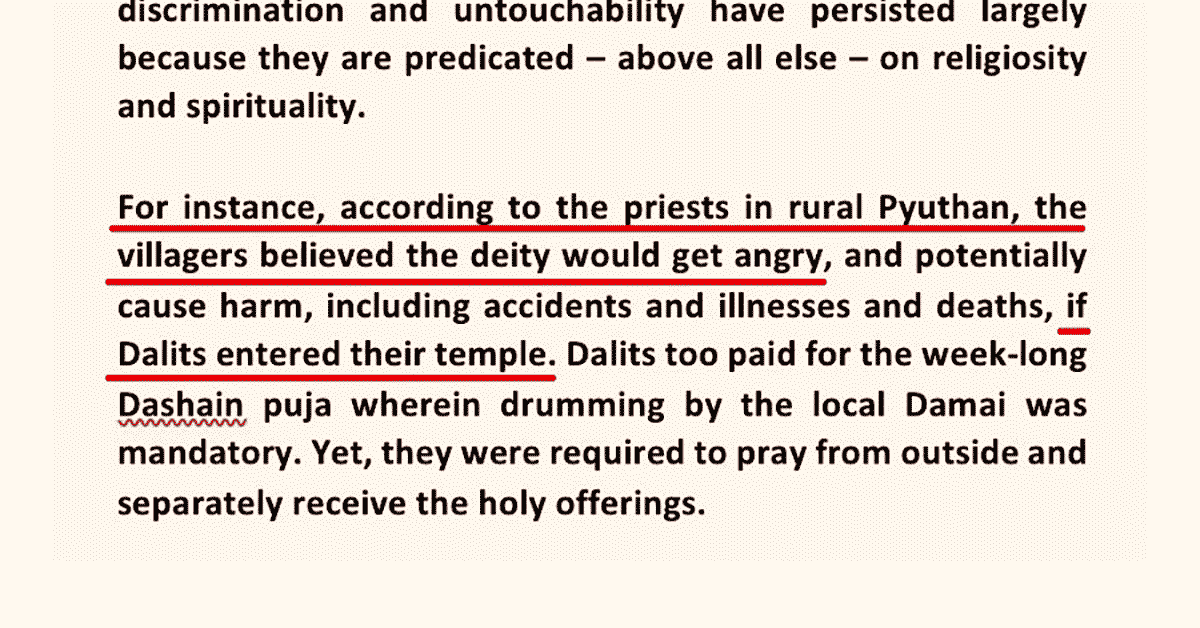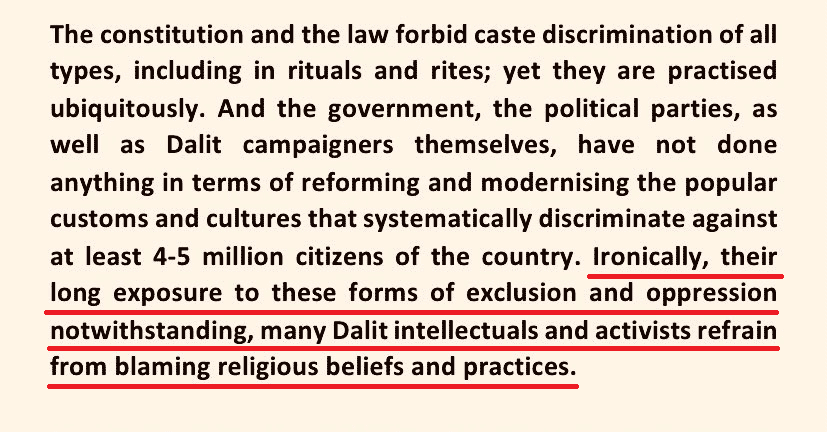If the Gods discriminate, why can’t — or even shouldn’t — the humans as well?!
That question popped up in my head reading the short piece Nepali Dalits and Religion by Dr. Mitra Pariyar on Twitter (see below).
Nepali Dalits and religion pic.twitter.com/kE1ANlnxPO
— Dr Mitra Pariyar (@MitraPariyar) March 11, 2021
(Click here to view the piece.)
But before that a little bit about the Hindu social system. Dalits, in the Hindu social system — the caste system — slot into the bottom rung. They are the “Untouchable castes” (see image below).

Both in India and Nepal, the caste system is widely accepted and its dictates followed more or less. That has had devastating consequences for millions for generations including inflicting generational trauma.
And how does one know who is who in terms of caste? The surname of a person more or less reveals one’s caste. (There can be confusion with some surnames because, among other reasons, they are shared by two or more castes.)
Dr. Pariyar’s surname, for example, tells us that he is a Dalit. It reveals even more! As per the system, his surname also tells us that tailoring is his birth occupation — yes, that’s THE thing in the caste system. You are BORN into an occupation, and in that way, as far as Hindus are concerned, birth is an end NOT a beginning…as it actually IS!

The short piece by Dr. Pariyar is about how caste-based discrimination is very closely tied to religion — mainly Hinduism. Sadly, in Nepal, some non-Hindus also practice caste-based discrimination. The Tibetan-Buddhists in Upper Mustang, the area I am from, for example, is a group that do.
That is, even us Mustangis in — or from — a part of the Nepal where we are (Tibetan)Buddhists by birth, grade ourselves and discriminate against those slotting into the lower rungs of the social ladder. (Buddha, if you didn’t know, preached AGAINST the caste system.) Yes, the indigenous people of Upper Mustang classify and discriminate one another.
Whether the classification is based on the caste system or an indigenous practice influenced by it or an entirely indigenous one I don’t know. BUT what I do know for a fact is that we ALSO discriminate against Hindus belonging to the lowest castes, the Dalits. But I digress a little here.
To return to the question…Dr. Pariyar described something that caught my eye. See the underlined bits in the image below.
Here it is…for re-emphasis:
“[A]ccording to the priests in rural Pyuthan, the villagers believed the deity would get angry […] if Dalits entered their temple.” [Of course, emphasis is mine alone.]
I would be very VERY surprised and impressed if that belief were limited to ONLY Hindus living in rural Pyuthan. I would be surprised and impressed if only a small minority of about 80% of Hindus in the country believed that.
Anyway, if the Hindu Gods themselves discriminate against some humans (at least Dalits) the way at least some Hindus believe they do, what’s wrong with humans discriminating against the same humans?! After all, who better to follow than the Gods?!
Something else that almost caused my eyes to pop out was Dr. Pariyar’s discovery that even Dalit “intellectuals and activists” don’t blame “religious beliefs and practices” for the widely prevalent and frequent caste-based discriminations (see image below).
(Ok, I confess, I was exaggerating a bit about it almost causing my eyes to pop out!)
For re-emphasis, here’s a reproduction of that important find.
“Ironically, their long exposure to these forms of exclusion and oppression notwithstanding, many Dalit intellectuals and activists refrain from blaming religious beliefs and practices.” [Emphasis entirely mine…of course!]
To place the blame on religion, or to identify — or label — it as the root or even the main source of the discriminatory beliefs and practices would be, on one level and among a host of things, like saying that the Gods are wrong. I think anyway!
But, of course, how could the Gods be wrong?! They are infallible!
And, to many, therein likely lies the paradox and therefore not a point of contention. To me, however, that is a contradiction…at the minimum (about which could be a whole different blog post). (Hindus, I believe, love their contradictions and are able to live with them.)
I am NOT a Hindu, so what do I know how Hindu Gods work, what they believe, and how they act?!
However, truth be told, contradictions are one of the features of Hinduism which I actually find intriguing, insightful, and even appealing to some degree (about which could be another blog post all together too)!
What do you think?
P.S. Of course, it hasn’t escaped me that the question can be asked of other religions too in addition to the context of Hindus and their casteist beliefs and practices based entirely on what they believe what and who Gods are, what Gods apparently “believe,” how they apparently “think,” and how they are projected to “act” etc.


